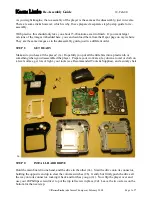
Additional information
81
Ad
dit
ion
al
in
fo
rm
a
tio
n
English
Appendix B: Glossary
480i/480p
Indicates the number of scanning lines and scanning
format of an image signal. 480i indicates 480 scanning
lines with interlaced format, and 480p indicates 480
scanning lines with progressive format.
Aspect ratio
A ratio which defines the shape of the rectangular
picture in a TV. It is the width of the picture relative to
the height. The conventional TV picture is 4:3 in
aspect ratio.
Bitstream
The digital form of multichannel audio data (e.g., 5.1-
channel) before it is decoded into its various channels.
Channel, CH
Stereo or multichannel audio consists of “channel”
signals. “Stereo” audio consists of left and right
channels, while 5.1-channel Dolby Digital consists of
six channels (front left, front right, rear left, rear right,
center and LFE (Low-Frequency Effect) channel for
sub-woofer, etc.).
Chapter
The smallest division on DVD VIDEO. It is a division of
a title and similar to a track for Audio CD or Video CD.
Component video
Video signals with three channels of separate
information that makes up the picture. There are
some types of component video, such as R/G/B and Y/
C
B
(P
B
)/C
R
(P
R
).
Composite video
A single video signal commonly used in most
consumer video products that contains all luminance,
color, and synchronization information.
Dolby Digital (AC3)
A six-channel system consisting of left, center, right,
left rear, right rear and LFE (Low-Frequency Effect
channel for sub-woofer, etc.) channels. All processing
is done in the digital domain.
Not all Dolby Digital discs contain six (5.1) channel
information.
Dolby Surround/Dolby Prologic
Dolby Surround is a five-channel system consisting of
left, center, right and left rear, right rear channels. All
processing is done in the digital domain.
Dolby Prologic is a four-channel system consisting of
left, center, right and rear channel (the single rear
channel is usually played through two speakers).
Down-mix
Internal stereo mix of multichannel surround audio by
a DVD player. The down-mix signals are output from
stereo output connectors.
DTS
A Digital Surround audio encoding format configured
with six (5.1) channels, similar to Dolby Digital. It
requires a decoder, either in the player or in an
external receiver. DTS stands for Digital Theater
Systems.
Not all DTS discs contain six (5.1) channel
information.
Dynamic range
The difference between the loudest and softest
sounds.
Dynamic range compression
The dynamic range compression (DRC) reduces the
dynamic range so that you can turn down the volume
to avoid disturbing others yet still hear the detail of
quiet passages.
Extension
Several letters at the end of a file name. File name
extensions usually follow a period and indicate the
type of information stored in the file.
Finalize
When conducting multisession recording, this means
the closing of a session (fixing) by indicating the
halting of writing so as to prevent the addition of any
more sessions.
Fs
See “Sampling frequency.”
Group
The largest division on DVD AUDIO.
ID3 tag
The tag embedded in an MP3 file indicating what
songs, artists, and album they comes from. You can
edit these tags.
Interlaced scan
In the conventional video system, a picture is shown
on the display monitor in two halves. The Interlaced
scanning system places lines of the second half of the
picture in-between lines of the first half of the picture.
ISO 9660 Format
The most common international standard for the
logical format for files and directories on a CD-ROM.
JPEG
A popular file format for still image compression.
JPEG stands for Joint Photographic Experts Group.
There are three sub-types of the JPEG format as
follows.
• baseline JPEG:
used for digital cameras, web,
etc.
• progressive JPEG: used for web.
• lossless JPEG:
an old type and rarely used
now.
S600(J).book Page 81 Tuesday, June 4, 2002 10:43 AM






































